Key Competencies Kit
for Facing Lifelong Learning


 |
This Project has been funded with support from the European Commission. This communication reflects the views only of the author, and the Commission can not be held responsible for any use which may be made of the information contained therein. |
 |
Didactic Unit 2 |
Theme |
Time |
Skills for effective lifelong learning |
recognize the need lifelong learning; |
3 hours |
formulate a systematic approach to learning |
||
set individual learning goals; |
||
plan for and monitor achieving learning goals (time management); |
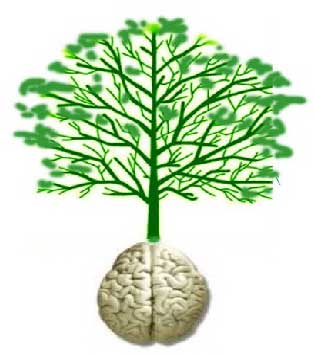
Being clear about your reasons for learning, and what you want to achieve from your learning is important if you want to get the most from your learning. To be clear about this, you must understand where you have come from, and where you are going to.

Adult learners are people who have life experience and often they are self-directed and want to set their own learning goals themselves.
It is important to set goals that you can achieve.
If you want to succeed, you need to set goals. Without goals you lack focus and direction. Goal setting not only allows you to take control of your life's direction; it also provides you a benchmark for determining whether you are actually succeeding. Think about it.
Have you thought about what you want to be doing in five years' time?... Are you clear about what your main objective at work is at the moment?... |
Setting learning goal is much more than simply saying you want to learn something. You should clearly define exactly what you want to learn and understand why you want it the first place. Having skill of goal setting you can set goals with confidence and enjoy the satisfaction that comes along with knowing you achieved what you set out to do. What will you decide to accomplish today?
Learning goal setting gives you long-term vision and short-term motivation. They focus your acquisition of knowledge and help you to organize your time and your resources so that you can make the very most of your life. By setting goals, you will also raise your self-confidence, as you recognize your ability and competence in achieving the goals that you have set.
 |
Learning goal setting is an important method of:
|

Here are important points in learning goal setting:
When you set goals for yourself, it is important that they motivate you: This means making sure it is something that's important to you and there is value in achieving it. Motivation is key to achieving learning goals.
Goal achievement requires commitment, so to maximize the likelihood of success, you need to feel a sense of urgency and have an "I must do this" attitude. When you don't have this "must do" factor.
Tip:To make sure your learning goal is motivating, write down why it's valuable and important to you. Ask yourself, "If I were to share my goal with others, how would I tell them to convince them it was a worthwhile goal?" |
You have probably heard of "SMART goals" already. But do you always apply the rule? The simple fact is that for any goal to be achieved it must be designed to be SMART. There are many variations on what SMART stands for, but the essence is this - goals should be:
Specific learning goals
- Your learning goal must be clear and well defined. Vague or generalized goals are not achievable because they don't provide sufficient direction in learning.
For example, - I need to learn communication skills in two months time – is a focused concrete goal. While – I need to improve my social skills – is too generalised to be achieved..
Measurable learning goals.
Include precise amounts, dates, etc in your goals so you can measure your degree of success.
For example, I need to learn communication skills, pass test and obtain certificate in two months time.
Attainable learning goals.
Make sure that it's possible to achieve the goals you set. If you set a goal that you have no hope of achieving you will only demoralize yourself and erode your confidence in ability to learn.
However, resist the urge to set goals that are too easy. By setting realistic yet challenging goals you hit the balance you need.
Relevantlearning goals.
Learning goals should be relevant to the direction you want your life and career to take. By keeping goals aligned with this, you'll develop the focus you need to get ahead and do what you want. Set widely scattered and inconsistent goals and you'll fritter your time - and your life - away.
Time-bound learning goals.
Your learning goals must have a deadline.
Set learning goals in writing
The act of writing down a goal makes it real and tangible. You have no excuse for forgetting about it. As you write, use the word "will" instead of "would like to" or "might". For example, "I will learn computer skills by end of May this year. Not, "I would like to learn computer skills by end of May this year." The first goal statement has power and you can "see" yourself improving your computer literacy, the second lacks passion and gives you an out if you get sidetracked.
Tip: Frame your goal statement positively. If you want to improve your computer literacy say, "I will learn how to work with Excell word and apply knowledge in practice. " rather than "I will learn all about Excell Word." The first one is motivating; the second one still has a get-out clause "allowing" you to succeed even if knowledge you will aquire will be not enough to allow to work |
 |
Goals are set on a number of different levels: First you create your "big picture" of what you want to achieve learning. Second, you break these down into the smaller and smaller targets that you must hit so that you reach your ultimate goals. Finally, once you have your plan, you start working to achieve it. |
The first step in setting learning goals is to consider what you want to achieve learning by a time at least, say, 5 years in the future) as setting long term goals gives you the overall perspective that shapes all other aspects of your decision making.
To give a broad, balanced coverage of all important areas in your life, try to set goals in some of these categories (or in categories of your own, where these are important to you):
If you are jobless, or have a job that do not satisfy you - you need to improve your competitiveness in the labour market. To do so you need to strengthen your key competences and/or improve vocational skills.
Do you want to make the world a better place? If so, how – by taking part in community development; by setting up NGO?
Tip: Set priorities: When you have several goals, give each a priority. This helps you to avoid feeling overwhelmed by too many goals, and helps to direct your attention to the most important ones. |
Once you have set your „umbrella“ (five year learning goals, for example), set a year 6 month plan, and 1 month plan of progressively smaller (operational) goals that you should reach to achieve your bigger goal. Then create a daily to-do list of things that you should do today to work towards your ultimate learning goals.
Tip: Keep operational goals small: Keep the low-level goals you are working towards small and achievable. If a goal is too large, then it can seem that you are not making progress towards it. Keeping goals small and incremental gives more opportunities for reward. Derive today's goals from larger ones. |
Periodically review the longer term plans, and adjust them to changing priorities and experience.
Be precise: Set a precise goal, putting in dates, times and amounts so that you can measure achievement. If you do this, you will know exactly when you have achieved the goal, and can take complete satisfaction from having achieved it. |
 |
|
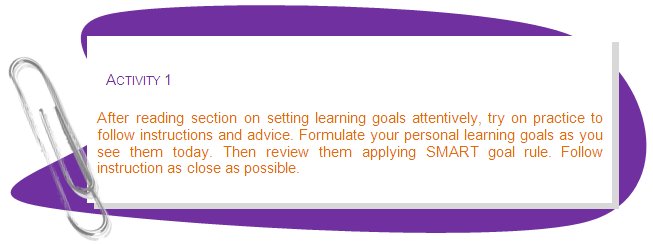
After you have set learning goals you need good time management skills to achieve them.
Time management skills are essential skills for effective people.
At the heart of time management is an important focus: Concentrate on results, not on being busy. Many people spend their days in a frenzy of activity, but achieve very little, because they're not concentrating their effort on the things that matter the most.
The 80:20 Rule |
| How often do you find yourself running out of time? Weekly, daily, hourly? For many, it seems that there's just never enough time in the day to get everything done.
|  |
When you know how to manage your time you gain control. Time management helps you to choose what to work on and when. This is essential if you're to achieve anything of any real worth.
Time management in achieving learning goals is best done on a regular basis, for example at the start of every week. Go through the following steps in preparing your learning schedule:
1. Start by planning ho much time you want to spend on learning. This will depend on your job and on your personal goals in life.
2. Next, step- identifies the actions you absolutely must do. For example, if you study computer literacy, then you must make time available for practical work and plan your access to computer. Review your activities, and schedule according to priorities.
3. Next, step foresees additional time. Reality of many people's work is of constant interruption. Obviously, you cannot tell when interruptions will occur. However, by leaving space in your schedule, you give yourself the flexibility to rearrange your schedule to react effectively to urgent issues.
 |
Scheduling is the process by which you plan your use of time. By scheduling effectively, you can reduce stress and maximize your effectiveness. This makes it one of the most important time management skills you can use. |
Before you can schedule efficiently, you need an effective scheduling system. This can be a diary, calendar, paper-based organizer, or a software package like MS Outlook. The best solution depends entirely on your circumstances.
Scheduling is a five-step process:
If you have little or no discretionary time left by the time you reach step five, then revisit the assumptions you have made in steps one to four.
 |
A well thought-through schedule allows you to manage your commitments, while still leaving you time to do the things that are important to you. It is therefore your most important weapon for beating work overload. Why time management is important for achieving learning goals? Can you effectively manage your time without goal setting and prioritising tasks? |
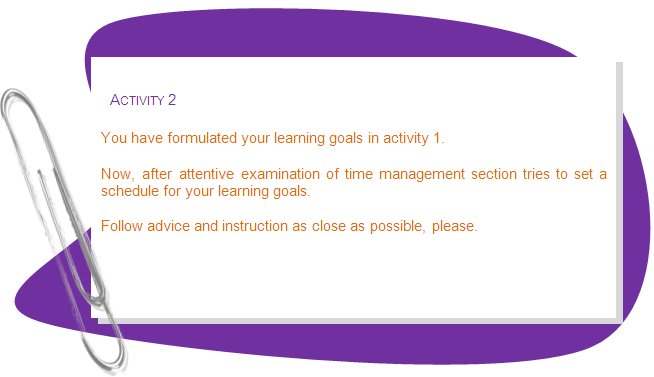
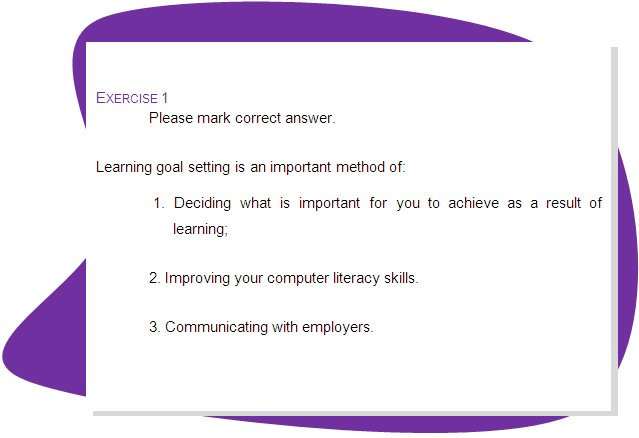
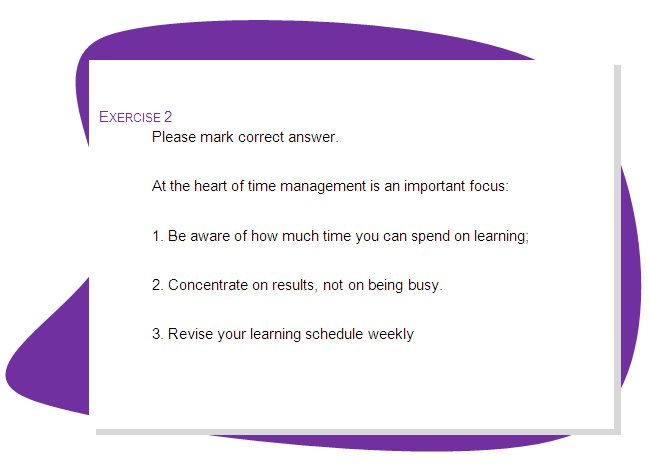
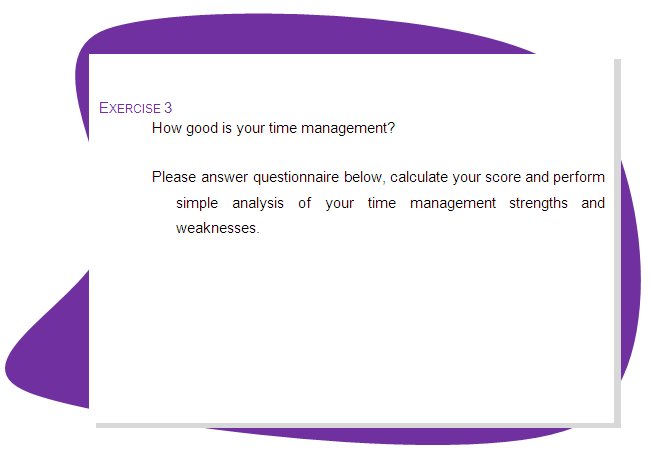
How good is your time management?
1. Do you find yourself completing tasks at the last minute, or asking for extensions?
1. Never
2. Rarely
3. Often
2. Do you set aside time for planning and scheduling?
1. Never
2. Rarely
3. Often
3. Do you know how much time you are spending on the various jobs you do?
1. Never
2. Rarely
3. Often
4. Do you use goal setting to decide what tasks and activities you should work on?
1. Never
2. Rarely
3. Often
5. Do you prioritize your “To Do” list?
1. Never
2. Rarely
3. Often
6. Before you take on a task, do you check that the results will be worth the time put in?
1. Never
2. Rarely
3. Often
 |
Answers to the questions and exercises of Didactic Unit 2 |
1.
2.
This is a very simple test it can not reveal all skills that you need to improve but only gives general answer to a question – do you have basics of time management?
Score 1.- 1 point; 2- 2. points; 3. – 3 points. If your score is 18 you have basic time management skills. If your score is between 15-12 you need to revise areas in which your skills are weak and strengthen them. If your score is close to 6 you need to pay serious attention to your time management skills.